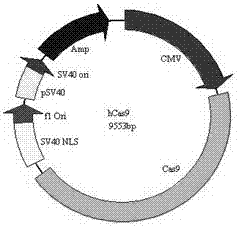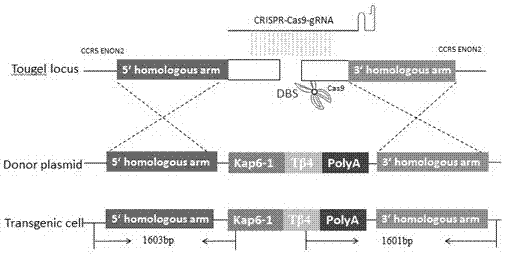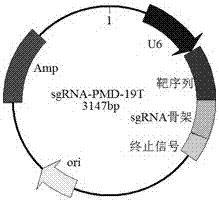Method for mediating site-directed knock-in of goat Tbeta4 gene based on CRISPR/Cas 9 technology
A goat and gene technology, applied in the fields of molecular biology and animal genetics and breeding, to achieve the effect of improving safety
- Summary
- Abstract
- Description
- Claims
- Application Information
AI Technical Summary
Problems solved by technology
Method used
Image
Examples
Embodiment 1
[0035] Example 1 Optimization of CRISPER-Cas9 vector
[0036]Optimize the CRISPR-Cas9 expression vector purchased from Beijing Zhongyuan Company. The nucleotide sequence of the optimized CRISPER-Cas9 vector (i.e. hCas9 plasmid) is shown in SEQ ID NO: 1. The hCas9 plasmid map is shown in figure 1 .
Embodiment 2
[0037] Example 2 Construction of gRNA expression vector.
[0038] According to the goat CCR5 gene sequence (NC-022314.1), the gene sequence is shown in SEQ ID NO:2. A gRNA sequence was designed on the exon 2 sequence of the CCR5 gene, and a gRNA expression vector based on the CRISPER-Cas9 system was constructed. The gRNA expression vector includes four parts: U6 promoter, target sequence, gRNA backbone and termination signal. Based on the CRISPR-Cas9 system to mediate the goat Tβ4 gene site-specific knock-in pattern, see figure 2 . Wherein, the DNA sequence of the sgRNA action site is as follows: sgRNA1: 5'- TCGTGGGGGAGAAGTTCCGA -3'. Use biological software to design the sgRNA sequence according to the sgRNA action site, and use PrimeSTAR with gRNA-T2 as the template ® The fidelity enzyme was used to PCR amplify the U6 promoter part and the gRNA backbone carrier part. Finally, the whole PCR method was used to amplify the gRNA, and it was treated with A tail. After the tr...
Embodiment 3
[0039] Example 3 Transfection of goat fetal fibroblasts by electroporation.
[0040] The fetal fibroblasts were thawed in a 100mm culture dish. In order to restore the cells to a good state and vitality, the cells were passaged before transfection by electroporation. When the cells grow to 90%, wash with PBS, digest with 0.25% trypsin for 3 minutes, add DMEM / F12 culture medium containing 15% fetal bovine serum to terminate the digestion of the cells, blow repeatedly with a gun to avoid cell clumps, and place The cell suspension was added to a 10mL centrifuge tube, centrifuged at 1500rpm for 5min, and the supernatant was discarded. Resuspend the cells with 5mL Opti-MEM, centrifuge at 1500rpm for 5min, discard the supernatant, and repeat this process 3 times. Finally, cells were resuspended with Opti-MEM so that each 90 µL cell suspension contained 1×10 6 Fetal fibroblasts, take 90 µL of resuspension and add 10 µL of plasmid (5 µg of CRISPR / Cas9 circular plasmid, 5 µg of 455bp...
PUM
 Login to View More
Login to View More Abstract
Description
Claims
Application Information
 Login to View More
Login to View More - R&D Engineer
- R&D Manager
- IP Professional
- Industry Leading Data Capabilities
- Powerful AI technology
- Patent DNA Extraction
Browse by: Latest US Patents, China's latest patents, Technical Efficacy Thesaurus, Application Domain, Technology Topic, Popular Technical Reports.
© 2024 PatSnap. All rights reserved.Legal|Privacy policy|Modern Slavery Act Transparency Statement|Sitemap|About US| Contact US: help@patsnap.com










